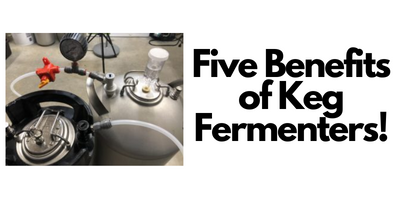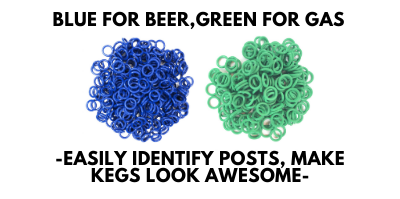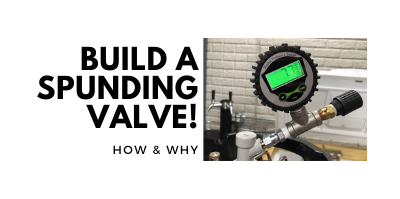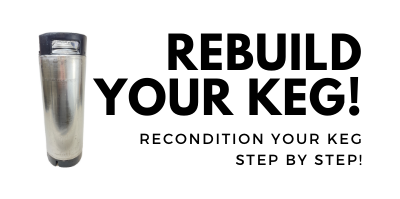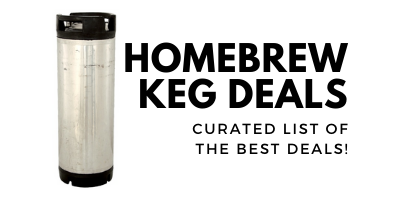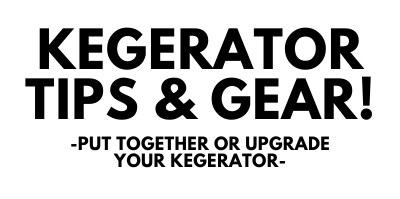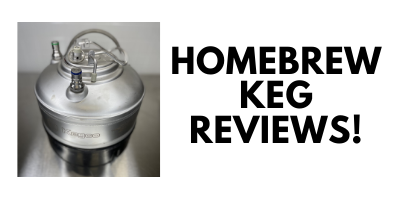
Hands on Review: Torpedo 10 Gallon Ball Lock Homebrew Kegs!
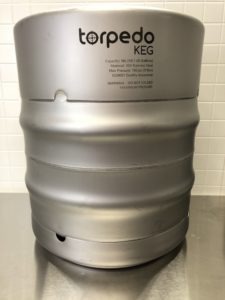
Updated: February 20, 2025
Larger 10 and 15 gallon homebrew kegs have been very hard to find… for years. There have been a couple sources, eBay was a best bet, but that was touch and go at best. When you could find one, prices were… outrageous. $300++ for a used 10 gallon keg would not be uncommon. Again, that’s IF you could find one.
Great news homebrewers…. MoreBeer has introduced 10 and 15 gallon homebrew ball lock kegs via their Torpedo line of kegs and accessories. These are BRAND NEW kegs that are (hopefully) readily available at a reasonable price.
Why a larger 10 or 15 gallon homebrew keg?
The first and most obvious answer is for large batch brewers. If you brew 10 or 15 gallon batches, it sure would be nice to have a keg that fits your entire batch. Even if you don’t brew 10 gallons, you may want to brew a couple 5 gallon batches of the same beer (much like professional brewers do) and keg it in a single keg.
A less obvious answer to the question is… to use as a fermenter. Kegs are well-built stainless steel vessels that are pressure capable. You can easily move them around and they are built to be bumped around a bit. Using a keg opens up some really interesting possibilities…. fermenting under pressure with a Spunding Valve [See: Build a Spunding Valve! – How and Why], naturally carbonating in the fermenter/Krausening (again with the aid of a Spunding Valve), transferring under pressure, oxygen-free (or near oxygen-free) transfers, re-purposing expelled CO2 and more.
A third application is similar to the second… Use as a UniVessel. Ferment and serve in the same vessel. Save time and simplify your process.
Limited Time DEAL on Used 15 Gallon Torpedo Kegs!
Torpedo Keg | Ball Lock Keg | Stainless Steel Corny Keg | 15 gal.
More InfoFrom the product description, check product page for current description, price and availability:
This used Torpedo ball lock 15 gallon keg has the same great features and superior quality as its predecessors, and will allow large-scale homebrewers to fit their entire batch into a single keg. These kegs are laser welded by an ISO certified commercial keg manufacturer, so you won’t find any nooks or crannies for contaminants to hide. Made with rolled stainless steel handles that are comfortable to grab. “In” and “Out” are etched near the keg posts for a quick and mistake-free set up when connecting lines in a refrigerator or kegerator. The 15 gallon kegs can be stacked on top of each other with ball lock fittings still attached.
Specifications:
Total Capacity: 15.2 gal.
Max Pressure: 130 psi
PRV Rating: 85 psi
Height: 24.75″
Diameter: 16.05″
Made from 304 Stainless Steel
Shipping Box Dimensions: 25-3/4″ H x 18″ L x 18″ W
Weight: 32.16 lbs
These kegs are used but in excellent condition. I have a good number of these but when they are gone they are gone and tough to find. They have only been rinsed and examined during refurbishing so Corny Keg recommends that you clean and sanitize before use. The kegs pictured are stock photos of new kegs but these used kegs look great and will perform like new or we will take them back.
- cornykeg,com has a limited number of used 15 gallon Torpedo Ball Locks.
- These are are on sale for just $135. That’s over $100 off list and a bargain for a 15 gallon keg!
- Quantities are limited, check the product page to see if you can still get in on this.
Used Torpedo 15 Gallon Ball Lock Corny Keg
Compare!…
For comparison the other 15 gallon keg offering they have is selling for a whopping… $735.95. Generally speaking, I would say that’s market price. These older 15 gallon Cornelius kegs are hard to find. Granted this isn’t an apples to apples comparison, but the idea is sold. $135 is a stellar deal.
Check Prices, Review Continues Below
- Torpedo Ball Lock Keg – 10 gal. KEG810
- Torpedo Ball Lock Keg – 15 gal. KEG815
- Used Torpedo 15 Gallon Ball Lock Corny Keg
- Complete Torpedo Keg Lineup
- Hands on Review: Torpedo Ball Lock Kegs from MoreBeer (review of a more standard size)
This article contains affiliate links. We may make a small percentage if you use our links to make a purchase. You won’t pay more and you’ll be supporting Homebrew Finds and more content like this. Thank you for your support!
Hands on Review MoreBeer’s 10 Gallon Torpedo Ball Lock Homebrew Keg
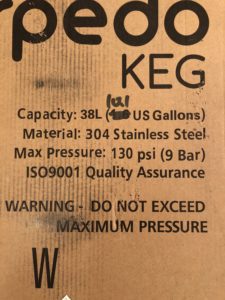 A look at some info on the outside of the box. Made of 304 Stainless Steel, ISO9001 Quality Assurance. 38 Liter Volume Capacity and a warning not to exceed maximum rated pressure.
A look at some info on the outside of the box. Made of 304 Stainless Steel, ISO9001 Quality Assurance. 38 Liter Volume Capacity and a warning not to exceed maximum rated pressure.
Related: Benefits of Using Kegs for Fermentation
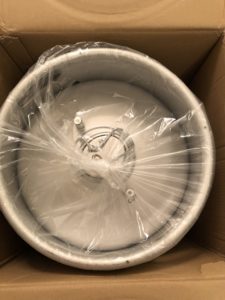 A look inside the box. This was nicely packaged and arrived in perfect condition.
A look inside the box. This was nicely packaged and arrived in perfect condition.
 A look at the 10 Gallon Torpedo Keg
A look at the 10 Gallon Torpedo Keg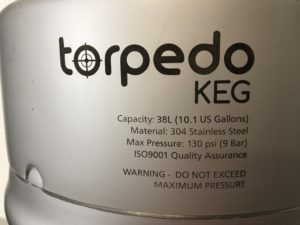 Close up of the logo and specifications.
Close up of the logo and specifications.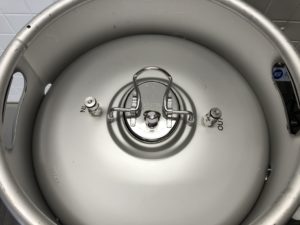 A top down view of the keg
A top down view of the keg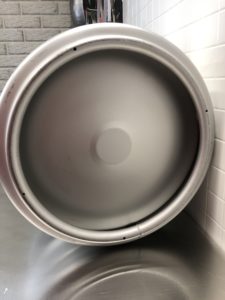 A look at the bottom of the keg
A look at the bottom of the keg
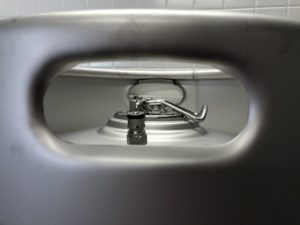 A close of look at the integrated handles. These are nicely rounded and comfortable to use.
A close of look at the integrated handles. These are nicely rounded and comfortable to use.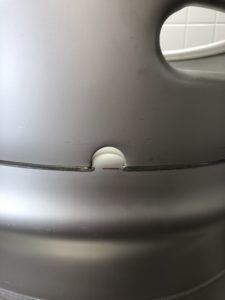 The top collar features some knock-outs or cut outs to help with drainage and drying.
The top collar features some knock-outs or cut outs to help with drainage and drying.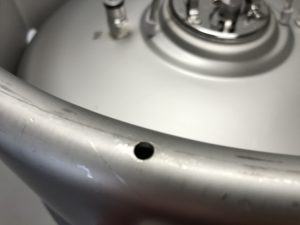 The top of the keg curls around presumably to strengthen it and provide a smooth surface. It also features some holds for airflow and drying.
The top of the keg curls around presumably to strengthen it and provide a smooth surface. It also features some holds for airflow and drying.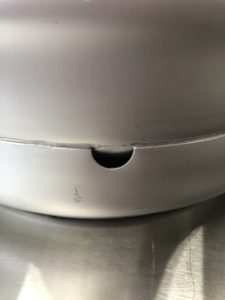 The skirt at the bottom of the keg also has some holes for ventilation. I think these are great. This is a fairly large keg and the fact that they are built to allow some air movement is a good thing.
The skirt at the bottom of the keg also has some holes for ventilation. I think these are great. This is a fairly large keg and the fact that they are built to allow some air movement is a good thing.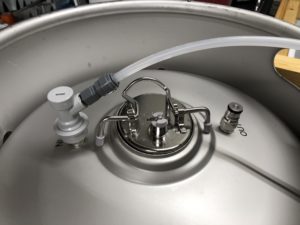 I wanted to test the keg for leaks. To do that I hooked up my C02 to fill the keg and planned to monitor with my Kegland BlowTie Spunding to see if pressure changed over time. I quickly noticed that CO2 WAS NOT flowing. I did some troubleshooting and finally realized… the keg was pressurized already.
I wanted to test the keg for leaks. To do that I hooked up my C02 to fill the keg and planned to monitor with my Kegland BlowTie Spunding to see if pressure changed over time. I quickly noticed that CO2 WAS NOT flowing. I did some troubleshooting and finally realized… the keg was pressurized already.
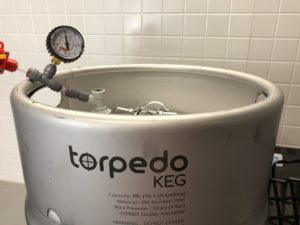 Checking pressure with my Kegland BlowTie Spunding – Hands on Review
Checking pressure with my Kegland BlowTie Spunding – Hands on Review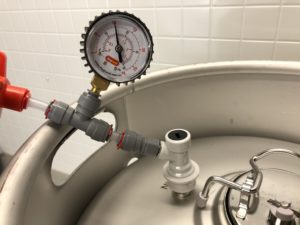 A close of look at the pressure gauge. This came shipped to me at right around 15 PSI. This proves that the keg holds pressure well.
A close of look at the pressure gauge. This came shipped to me at right around 15 PSI. This proves that the keg holds pressure well.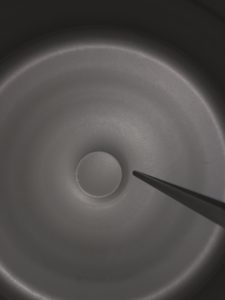 A look inside the keg. It’s really hard to tell because of lighting, but the inside looks really good.
A look inside the keg. It’s really hard to tell because of lighting, but the inside looks really good.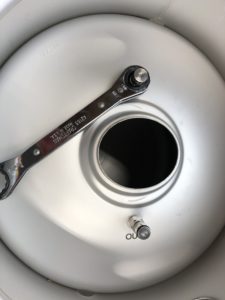 The collar on this keg means there is little room to turn a wrench. The pictured wrench is a Craftsman Ratcheting Flat Box Wrench with two sizes 11/16″ and 7/8″. Those are the most common two sizes of standard posts, so, in my opinion, this wrench is a perfect keg wrench. This keg has 7/8″ posts. See: Craftsman 5 pc/10 Sizes Wrench Set, Ratchet Box End SAE 42160 affiliate link, note that multiple variations of this product may be available, as such a different version may appear at this link, affiliate link, note that multiple variations of this product may be available, as such a different version may appear at this link
The collar on this keg means there is little room to turn a wrench. The pictured wrench is a Craftsman Ratcheting Flat Box Wrench with two sizes 11/16″ and 7/8″. Those are the most common two sizes of standard posts, so, in my opinion, this wrench is a perfect keg wrench. This keg has 7/8″ posts. See: Craftsman 5 pc/10 Sizes Wrench Set, Ratchet Box End SAE 42160 affiliate link, note that multiple variations of this product may be available, as such a different version may appear at this link, affiliate link, note that multiple variations of this product may be available, as such a different version may appear at this link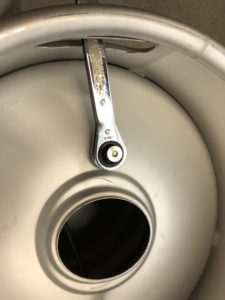 You can also put a wrench through the handles. In my experience it was possible to loosen and tighten the ball lock posts on this keg with a wrench, however… it’s not easy. If you’re going to get one of these, you should pick up a socket to tighten and loosen posts.
You can also put a wrench through the handles. In my experience it was possible to loosen and tighten the ball lock posts on this keg with a wrench, however… it’s not easy. If you’re going to get one of these, you should pick up a socket to tighten and loosen posts.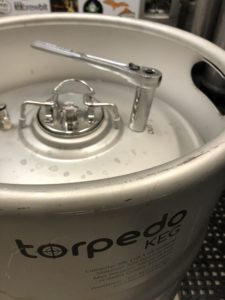 Here’s a Craftsman 11/16″ Deep Well Socket working with the 11/16″ Ball Lock Post on this keg. Much easier! See: CRAFTSMAN Deep Socket, SAE, 3/8-Inch Drive, 11/16-Inch, 6-Point (CMMT43336) affiliate link, note that multiple variations of this product may be available, as such a different version may appear at this link, affiliate link, note that multiple variations of this product may be available, as such a different version may appear at this link
Here’s a Craftsman 11/16″ Deep Well Socket working with the 11/16″ Ball Lock Post on this keg. Much easier! See: CRAFTSMAN Deep Socket, SAE, 3/8-Inch Drive, 11/16-Inch, 6-Point (CMMT43336) affiliate link, note that multiple variations of this product may be available, as such a different version may appear at this link, affiliate link, note that multiple variations of this product may be available, as such a different version may appear at this link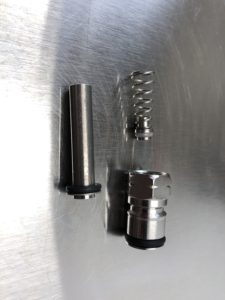 A look at the gas side dip tube, poppet and post. This uses what appears to be a standard universal style poppet. Related: Universal Poppet Tips and Tricks.
A look at the gas side dip tube, poppet and post. This uses what appears to be a standard universal style poppet. Related: Universal Poppet Tips and Tricks.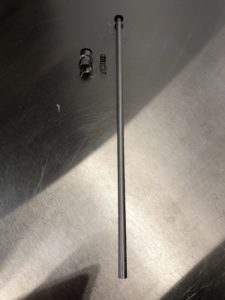 A look at the liquid side dip tube, poppet and post.
A look at the liquid side dip tube, poppet and post.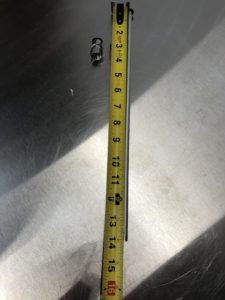 The liquid side dip tube is about 14″ in length.
The liquid side dip tube is about 14″ in length.
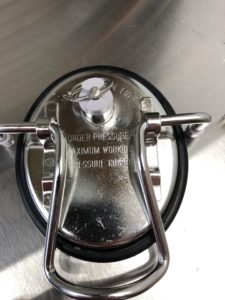 A look at the lid. Standard ball lock/pin lock size lid. Includes a manual PRV like most ball lock keg lids do. That’s a good thing. It should vent automatically for safety reasons, but the manual PRV is super handy for relieve pressure when required.
A look at the lid. Standard ball lock/pin lock size lid. Includes a manual PRV like most ball lock keg lids do. That’s a good thing. It should vent automatically for safety reasons, but the manual PRV is super handy for relieve pressure when required. 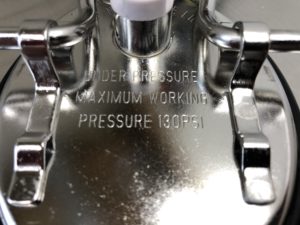 A close up look at the lid
A close up look at the lid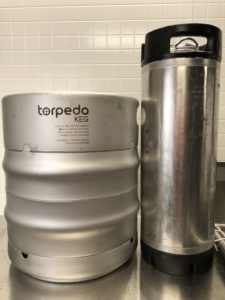 For size comparison next to a standard Cornelius Style Ball Lock Keg
For size comparison next to a standard Cornelius Style Ball Lock Keg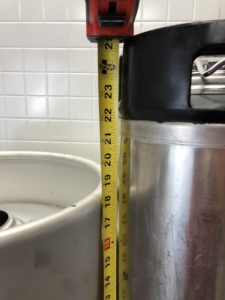 This standard ball lock keg measures about 25″ in height
This standard ball lock keg measures about 25″ in height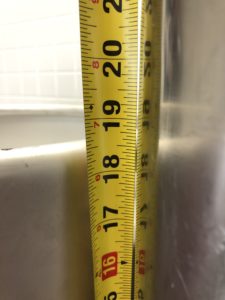 The Torpedo 10 Gallon Ball Lock is about 18 1/2″ in height
The Torpedo 10 Gallon Ball Lock is about 18 1/2″ in height
Using your Keg the First Time
New kegs come from factory environments. It’s important to give this keg (and any brand new keg) a thorough cleaning. A good soak in a strong PBW solution, maybe a second PBW soak for good measure, followed by a thorough rinse and round of sanitizer.
Official Specs of MoreBeer’s 10 and 15 Gallon Ball Lock Homebrew Kegs
10 Gallon Torpedo Keg
- Total Capacity: 10.1 gal.
- Max Pressure: 130 psi
- PRV Rating: 85 psi
- Height: 18-1/2″
- Diameter: 15-1/2″
- Made from 304 Stainless Steel
15 Gallon Torpedo Keg
- Total Capacity: 15.2 gal.
- Max Pressure: 130 psi
- PRV Rating: 85 psi
- Height: 24-5/8″
- Diameter: 15-3/4″
- Made from 304 Stainless Steel
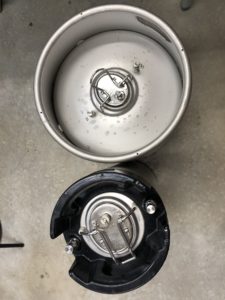 Top down compared to a standard ball lock corny keg
Top down compared to a standard ball lock corny keg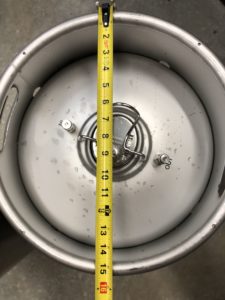 Measuring the top of MoreBeer’s 10 gallon Torpedo Keg
Measuring the top of MoreBeer’s 10 gallon Torpedo Keg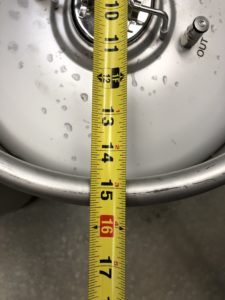 I’m seeing a diameter of about 15 1/2″. That’s right in line with official specs.
I’m seeing a diameter of about 15 1/2″. That’s right in line with official specs.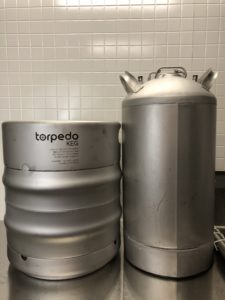 For size comparison next to what I would call a standard/old style 10 gallon Cornelius style ball lock keg
For size comparison next to what I would call a standard/old style 10 gallon Cornelius style ball lock keg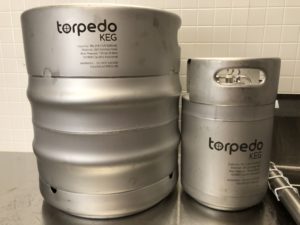 For size comparison, next to a 2.5 Gallon Ball Lock Torpedo Keg
For size comparison, next to a 2.5 Gallon Ball Lock Torpedo Keg
10 Gallon Torpedo Keg as a Fermenter!
 The 10 Gallon Torpedo Pictured with a Kegland BlowTie Spunding – Hands on Review
The 10 Gallon Torpedo Pictured with a Kegland BlowTie Spunding – Hands on Review
Kegs are well-built stainless steel vessels that are pressure capable. You can easily move them around and they are built to be bumped around a bit. Using a keg opens up some really interesting possibilities….
- Fermenting under pressure with a Spunding Valve
- Naturally carbonating in the fermenter/Krausening – again with the aid of a Spunding Valve
- Transferring from fermenter to serving keg under pressure
- Transferring already carbonated beer from fermenter to serving keg under pressure
- Oxygen-free (or near oxygen-free) transfers
- Use as a UniVessel. Ferment and serve in the same vessel. Simplify your process and clean less.
- Use CO2 produced by fermentation for flushing kegs and carboys – requires a BlowTie Spunding Valve.
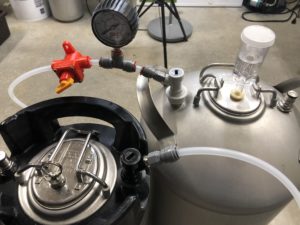 Illustration: Using expelled CO2 from fermentation to flush kegs, carboys and such. A side benefit if you use the Kegland BlowTie Spunding – for fermentation is that you can use expelled CO2 for flushing kegs and such. See my Hands on Review for more on that.
Illustration: Using expelled CO2 from fermentation to flush kegs, carboys and such. A side benefit if you use the Kegland BlowTie Spunding – for fermentation is that you can use expelled CO2 for flushing kegs and such. See my Hands on Review for more on that.
Converting 10 Gallon Torpedo Ball Lock to a Fermenter!
Two real things need to be done to use these as fermenters… #1 an airlock solution and #2 a way to transfer or serve without pickup up yeast and hop trub.
Air lock solutions…
- Spunding Valve. Use a ball lock Spunding Valve on the gas side – either fermenter under pressure or open up the valve to let gas flow freely.
- Remove the gas side poppet and use a blow-off tubing going into a container of sanitizer.
- Modified keg lids are available that have a hole dripped for a stopper and airlock.
Transfer solutions…
- Replace the liquid out dip tube with a Torpedo Keg Buoy… keep reading!
- Trim the liquid out dip tube so that you leave trub behind – the downside of that is that it’s a guessing game and changes from beer to beer.
- Siphon – nah… that’s no fun. Siphoning takes some of the benefits of keg-fermenting away.
Using the Torpedo Keg Buoy For Fermentation Transfers
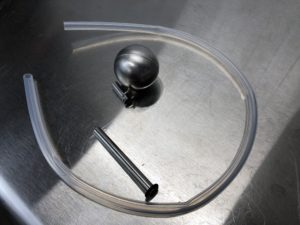 The Torpedo Keg Buy consists of a float, flexible silicone tubing and a short dip tube. It replace the liquid out dip tube of your keg. It’s designed to pull beer from the top or your keg while serving. That gets you clearer beer that’s carbonated more quickly (as compared to the beer on the bottom) and leaves trub behind. The float goes down with beer level and should settle on top of any trub layer. I don’t know that this was intended to be used as part of a fermentation setup, but hey, it’s a good idea.
The Torpedo Keg Buy consists of a float, flexible silicone tubing and a short dip tube. It replace the liquid out dip tube of your keg. It’s designed to pull beer from the top or your keg while serving. That gets you clearer beer that’s carbonated more quickly (as compared to the beer on the bottom) and leaves trub behind. The float goes down with beer level and should settle on top of any trub layer. I don’t know that this was intended to be used as part of a fermentation setup, but hey, it’s a good idea.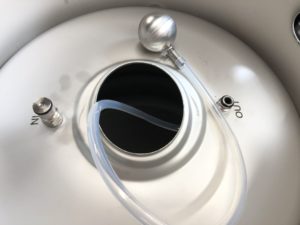 Here’s the Torpedo Keg Buoy Installed in the 10 gallon keg
Here’s the Torpedo Keg Buoy Installed in the 10 gallon keg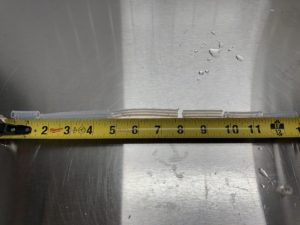 So, a problem with this idea, is out of the box, the tubing is just too long to work in the 10 gallon keg. The excess tubing causes the float to hang up on the way down. As you can see from all the segments, I had a lot of trial and error while testing. I ended up trimming about 13″ off. I’m not saying I have this process completely dialed in yet, but I feel like it’s close, if not all the way there. If you try it, please test for yourself and don’t over-trim your tubing.
So, a problem with this idea, is out of the box, the tubing is just too long to work in the 10 gallon keg. The excess tubing causes the float to hang up on the way down. As you can see from all the segments, I had a lot of trial and error while testing. I ended up trimming about 13″ off. I’m not saying I have this process completely dialed in yet, but I feel like it’s close, if not all the way there. If you try it, please test for yourself and don’t over-trim your tubing.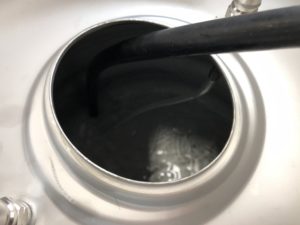 Filling up the keg with water for one of several transfer tests
Filling up the keg with water for one of several transfer tests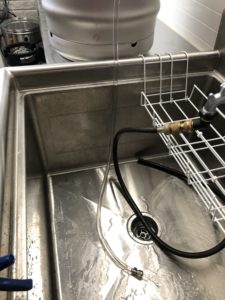 A gravity transfer test draining into my stainless steel brew area sink.
A gravity transfer test draining into my stainless steel brew area sink.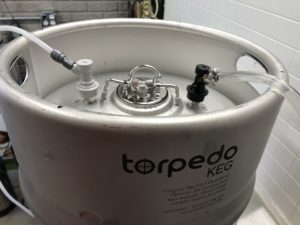 I also tried a CO2 pressure transfer test. I considered lifting this full keg to somehow get the test lined up, but that I realized I have EVABarrier Tubing and DuoTight Fittings – which basically makes me a super hero when it comes to plumbing draft lines – so I just got a coil of tubing out and ran across my brewing area.
I also tried a CO2 pressure transfer test. I considered lifting this full keg to somehow get the test lined up, but that I realized I have EVABarrier Tubing and DuoTight Fittings – which basically makes me a super hero when it comes to plumbing draft lines – so I just got a coil of tubing out and ran across my brewing area.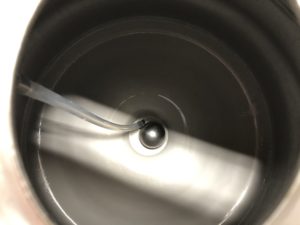 This is the result of my final gravity test. Hard to see because of lighting, but the Keg Buoy is sitting at the bottom of the keg and almost all of the water is drained. It’s really just a couple ounces. I tried to measure, but there wasn’t enough liquid to accurately pour.
This is the result of my final gravity test. Hard to see because of lighting, but the Keg Buoy is sitting at the bottom of the keg and almost all of the water is drained. It’s really just a couple ounces. I tried to measure, but there wasn’t enough liquid to accurately pour.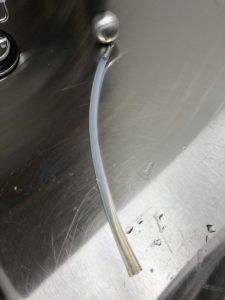 The modified Keg Buoy. Using this and a Spunding Valve allows you to convert the 10 gallon Torpedo Keg to a fermenter. Since the Buoy floats, there’s no guessing dip tube lengths and you can transfer under pressure. Look for more info in a future revision of this review as I continue testing.
The modified Keg Buoy. Using this and a Spunding Valve allows you to convert the 10 gallon Torpedo Keg to a fermenter. Since the Buoy floats, there’s no guessing dip tube lengths and you can transfer under pressure. Look for more info in a future revision of this review as I continue testing.
Conclusions
This keg is versatile. It can function as a keg, as a fermenter and as a UniVessel. MoreBeer has done a great job with the design and build quality is good. Availability problems have plagued larger homebrew kegs for years. I’m glad that MoreBeer has filled this need with these awesome kegs.

Check Current Pricing & Availability
- Torpedo Ball Lock Keg – 10 gal. KEG810
- Torpedo Ball Lock Keg – 15 gal. KEG815
- Used Torpedo 15 Gallon Ball Lock Corny Keg
- Torpedo Keg Buoy Floating Dip Tube KEG655
- Complete Torpedo Keg Lineup
- Hands on Review: Torpedo Ball Lock Kegs from MoreBeer (review of a more standard size)
- Kegland BlowTie Spunding – Hands on Review
- Deep Socket for Body Connects – 7/8 in. (12 Point) KEG992 – via MoreBeer
- CRAFTSMAN Deep Socket, SAE, 3/8-Inch Drive, 11/16-Inch, 6-Point (CMMT43336) – affiliate link, note that multiple variations of this product may be available, as such a different version may appear at this link, affiliate link, note that multiple variations of this product may be available, as such a different version may appear at this link
Related Gear and Resources:
- Oxygen Free Transfer and Cold Crash Using a Spunding Valve
- Hands on Review: Kegland BlowTie Spunding Valve
- Build a Spunding Valve! – How and Why
- 10 gallon or 15 gallon keg Ball Lock Kegs – Hands on Review
- Convert a Keg Into a Fermenter
- Cornelius Keg Fermenter Lid via Adventures in Homebrewing
- Torpedo Buoy via MoreBeer – Hands on Review
- Hands on Review: DuoTight Fittings & EVABarrier Tubing
- Five Benefits of Using Corny Kegs As Fermenters
Kegland BlowTie v2
- BlowTie 2 Diaphragm Spunding Valve with Gauge FE962 via MoreBeer
- Duotight Blowtie Spunding Valve with Gauge via William’s Brewing
- Kegland BlowTie v1Duotight BlowTie 2 Diaphragm Spunding Valve w/Integrated Pressure Gauge (0-23 PSI) for Pressure Fermentation – KL15042 affiliate link, note that multiple variations of this product may be available, as such a different version may appear at this link
Kegland BlowTie v1
- BlowTie Diaphragm Spunding Valve FE960 – via MoreBeer
- BlowTie Diaphragm Spunding Valve Complete Kit FE961 – via MoreBeer
- BlowTie Diaphragm Ball Lock beer Spunding Valve Complete Kit for Home Brewing beer corny beer keg affiliate link, note that multiple variations of this product may be available, as such a different version may appear at this link
Related: Build a Spunding Valve!
tsrspundRelated: Benefits of Using Kegs for Fermentation
More MoreBeer Reviews+Related:
Should I buy a New Keg or a Used Keg?
Used kegs are generally sourced from soda bottlers. They are built with commercial use in mind and designed to last for many years of rough duty service.
Brand new ball locks may not be made to the same standards. However… We also don’t generally put our kegs through the same abuse that a soda distributor would.
Not withstanding price. I think both options are valid. If you’re up for a little elbow grease and replacing a few parts, used may be the way to go, if you’re more interested in convenience brand new is a good choice. Practically, at least as of this posting, I think price will cause many to go the used route.
Rebuild Your Used Kegs
Keg Deals!
kegdealsEverything For Your Kegerator!
More Keg Reviews!
Food Grade Keg O-rings in Bulk!
More Homebrew Finds!
- Last 50 Finds!
- Top Deals – a curated list of the best deals
- Homebrew Reviews – one of the largest libraries of homebrew reviews in existence!
- Our Top Posts – tips, how-tos, resources posts and more
This post may contain affiliate links. We may make a commission when you use our links. This will never cost you extra. Thank you for supporting Homebrew Finds!
greatdealsAlso: Kegerator Tips & Gear | Keg Repair Part #s | Recent Keg Finds
Our Top Draft Resources!
Check our our Top Draft Related Resources
- Commentary: Pin Lock Keg Pricing and Availability
- Check Your CO2 Regulator for Leaks!
- How to get a keg ready for first use? New Keg Cleaning and Prep
- Portable Draft Beer Serving Options!
- Pin Lock Keg Pricing and Availability
- The Most Difficult Spot to Check for CO2 Leaks
- Keg O-Ring Materials Selection! – EPDM, Silicone and Buna-N?
- Why Do I Have Bubbles in My Beer Line? Diagnosing and Fixing Kegerator Foam Problems
- Five Benefits of Using Corny Kegs As Fermenters
- Rebuilding & Reconditioning Homebrew Kegs!
- Food Safe Replacement Keg O-Rings in Bulk
- Hands on Review: Kegland DuoTight Fittings & EVABarrier Tubing!
- Why Won’t My Beer Carbonate? Fixing Draft Beer Carbonation Problems
- What Does a Flow Control Faucet Do?
- Upgrade Your Kegerator – 6 Improvements!
- Serve Homebrew on Any Kegerator & Convert Commercial Kegerator to Homebrew
- Tips and Gear for Growler Filling
- What’s the Difference Between Ball Lock Kegs and Pin Lock Kegs?
- Checking for Draft System CO2 Leaks – Using The Pressure Gauge Method
- Tip: Consider Oetiker Stepless Clamps for Kegerator Gas and Beer Lines
- Hands On Review: Inkbird ITC-308 Dual Stage Temperature Controller +WiFi Version
- Universal Poppets Tips and Tricks!
- Convert Your Mark II Keg & Carboy Washer to a Recirculating Draft Line Cleaning Pump!
- Step by Step: Finding and Fixing Keg CO2 Leaks
- Kegerator Temperature Probe Placement – To Immerse or Not To Immerse? – three tests to determine optimal pla…
- Kegerator Beer Line Temperatures & Reducing Foam with a Recirculating Fan
- Kegging CO2 Use Estimations and Calculations
- Balancing Your Kegerator Draft System
- Building a Simple Ball Lock Draft Line Flushing Setup
- Build a Recirculating Draft Line Cleaning Pump
- Home Brew Keg Roundup – New & Used, 5 and 2.5 Gallon & More!
- Damp Kegerator? Fix Kegerator Condensation
- Homebrew Temp Controller Roundup! – Kegerator and Fermentation – concepts, applications and models
- Bulk Keg Orings and Keg Parts Reference
Special Thanks to MoreBeer for providing the unit used for evaluation in this review.
Price, promotions and availability can change quickly. Check the product page for current price, description and availability.
Make sure the components you use are compatible and rated for your intended application. Contact manufacturer with questions about suitability or a specific application. Always read and follow manufacturer directions. tag:lnksfxd review:tdp10galkeg rs:8 tag:tpr


